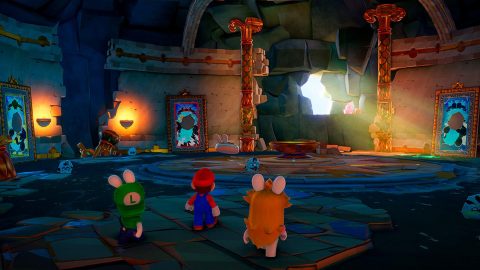
Rami Ismail is first and foremost a game developer, but these days he’s known to wear a number of hats. He’s an industry ambassador, a consultant, a curator, a public speaker, a business person, a podcaster, a marketeer, but at the end of the day, he says, “I’m still a programmer. I’m a game developer by trade, I can’t not make video games.”
Even so, you can be forgiven for not having played his games, at least not any recent ones. Vlambeer, the studio he had co-founded with his fellow school drop-out Jan Willem Nijman back in 2010, which surprisingly celebrated its tenth-anniversary last year by announcing its closure, though the duo’s last official release was bullet hell roguelike Nuclear Throne back in 2015, which the time supported for a few years. A final game, Ultrabugs, is supposedly still to come.
But while Vlambeer was known for acclaimed indie darlings such as its debut title Super Crate Box and the award-winning mobile game Ridiculous Fishing, it was also known for contributing so much more to the industry, such as Presskit (pronounced Do Presskit), a free presskit generating service developed by Ismail that’s now widely used by indie developers to promote their games.
“Vlambeer didn’t just become a game studio, it also became a statement,” says Ismail. “It was a statement that two kids could start a game studio, that GameMaker was a valid engine, that iOS was a platform you can make premium games on, that indies should be able to make games for console, that you can develop games live on Twitch, that you can take your marketing seriously – then we kind of ran out of things to say.”
It may be a surprise that Vlambeer went for as long as it did, given that Ismail and Nijman are infamously colleagues rather than friends, two people who respected each other’s work. When it became apparent that they wanted to take different directions, the decision was made to close the studio in September 2020, which effectively let them make one last statement, that you can quit while you’re ahead.

“Why would you let a studio with that history and relevance fade out over time, get less relevant, make games that aren’t quite as genuine or exciting anymore,” he continues. “Why don’t you just say, ‘Remember Vlambeer as a studio that existed at this flux of time, and it did weird, good stuff. And then they went different paths.’”
As for the paths taken, Nijman was quick to work on a dizzying number of projects with other small teams, such as 60-second RPG Minit, punishing roguelike Disc Room, and upcoming physical card game Dust Biters.
Ismail on the other hand is still figuring out his next steps. Technically, he’s been taking a year off, which he calls “probably the largest professional failure of my career” given how busy he’s been keeping himself, from co-hosting podcast The Habibis with two fellow Arab game developers Fawzi Mesmar (Dice) and Osama Dorias (WB Games Montreal) to writing newsletter Levelling The Playing Field to cover different facets of the games industry, while travel restrictions in the wake of the pandemic led him to start free online consultancy to help more game developers around the world.
“I think helping developers is one of the most lovely things you can do,” he explains. “I always tell young developers that when you get into the industry, just take as much as you can, take from people that have been here and people that are successful, people that are not successful, take from everybody. Then when you get to a point where you can give back, give back more than you took.”

You may however ask, what about Rami the game developer? While he tells me he’s still keeping his skills sharp working on a number of other projects for other studios and therefore can’t talk about them, there’s a sense that he’s less interested in what game he’ll make next and more in helping the next generation of developers. Ismail explains he ultimately still needs time to figure out how to reinvent himself, admitting he personally fell into a hole after being honoured at GDC in 2018 with the Ambassador Award.
“When you get a peer award for your work, it’s sort of like the biggest stage that we have in the games industry,” he says. “It’s like, ‘you do really great work, we appreciate you, thank you for doing that work.’ Okay, so am I done? But no, the work’s never done on making the industry more equal, making it more inclusive, making it more diverse, ensuring that people around the world have opportunities to participate in the industry the same way.”
As a Dutch-Egyptian raised as a Muslim, Ismail is known for being a very vocal figure in the industry championing diversity and inclusion, though he’s interested in more than just the strides in diverse representation on the screen but also who’s making those games. “I actually hear from a lot of people who work in diversity consultancy that studios are more interested in making sure that they represent people correctly. There’s not much of an increase in making sure people around the world can make games.”
Our discussion into diversity gets more complicated, such is the case for a topic that is by its very nature diverse but can easily become superficial or pigeonholing, or be criticised for not having enough of the ‘right’ representation. For instance, if a developer from Africa is making a game set in the West, are they not having their voices heard? But then does that mean the only games that get recognised are the ones that are about an expected cultural experience?

“Nobody goes, ‘you’re Dutch, you have to make a game about the Dutch experience’ – it’s really easy to forget that the people that are making games are making it with so many obstacles,” says Ismail. “They’re not near any game development hubs, they have to learn English before they can start game development, all the tools are relatively expensive from an economic point of view, they don’t have access to any of the resources, people or money that we have in the West. And then you’re like, it has to be about Africa – just let them make video games.”
I do wonder however, given the underwhelming lack of positive Muslim and Arab representation in video games, whether that is something Ismail had considered representing in Vlambeer’s games or something he would be more conscious of including in future games. On this, he corrects me: “The funny thing is, if you know, it’s there. If you look at Nuclear Throne, it’s a post-apocalyptic game about a bunch of mutants sitting around a campfire. If it was any other developer, there would have been alcohol, because it’s a post-apocalyptic trope. Ridiculous Fishing is about an old sad man on a boat after the end of the world, you would imagine a bottle of beer there, but it’s just not there. I think our games at Vlambeer have always had that quiet halal-ness to it, because that’s just who I am.”
He’s nonetheless conscious that different people of different marginalised or underrepresented groups want different kinds of representation, and ultimately there is no way of doing it right, not necessarily because the developers did anything wrong, “but if there is only one example of representation of an entire people, you will never get it right. But if you don’t do it, there will never be more than one example.”
To give an example, Ismail shares that his biggest personal disappointment in representation came in 2017’s Assassin’s Creed Origins: “It was about Egypt, And I’m Dutch-Egyptian. Then we had a contemporary main character who was computer savvy, Western-born, connected to her roots later in life, works on big things and has a moral compass that is kind of at odds with everybody around her. But she was a she.”

“If that person had been a he, it would effectively have been me in a video game,” he continues. “I was borderline angry when I realised that it was so close, which is so unreasonable of me, but it’s just I’ve never had that, I don’t even get to pick my Arab Muslim beard in video games. But then after two or three days, I’m like, ‘No, you cannot be disappointed about this, this is great’, but it’s when it gets close but not quite that it hurts so much more.”
What Ismail wants to do next then – though he admits it might be more a dream right now – is a way to improve diversity and inclusion in the games industry on a larger scale. He’s not sure at this point whether by bigger he means a large indie studio or moving to triple-A or something else, though he tells me, “If I can do something bigger correctly, I can also help people in ‘corporate’ ways, without having to be terrible to get there.”
“One of the things that really frustrated me about Vlambeer was that if you’re so small, the opportunities to help are actually scaled by how big you are,” he continues. “So if I wanted to help someone get a visa to come to Europe or the US or set up an event, I always had to knock on the door of a publisher, platform, engine, or somebody with money to be able to get funding.”
“People want an economical factor to it. They want to hear diversity is good because performance is higher, or more market share. Hell no, diversity is good because diversity is good! Because it’s fair that if we have this global medium, and everybody on Earth can play video games in some way or shape, why are only a few people making those video games? I’m watching the news and every third day, there’s another studio with like 26 white people launching. How can it be in 2021 and despite everything that has happened over the last few years, it’s the same story, week after week?”
Ismail instead wants to imagine being able to set up a large studio from the ground up that is diverse, inclusive, transparent, and accountable. In other words, as with Vlambeer, he wants the next thing to also be a statement.
“I just really want to prove that you can do the thing that we’re doing now better, because if you can prove that, there’s no excuse for everybody else anymore,” he adds. “I don’t know if you can build a company that can sustain that meaningfully for a long period of time. I don’t want to mess it up, because if we’re going to do the right thing and then immediately fail, it’ll convince everybody that you shouldn’t do the right thing. But this conversation has increasingly convinced me that I should just do it! I’m not done yet – there’s a lot of work to do.”
You can check out all of Vlambeer’s games at the studio’s website.
The post Rami Ismail: “The work’s never done on making the games industry more equal, inclusive, and diverse” appeared first on NME.








